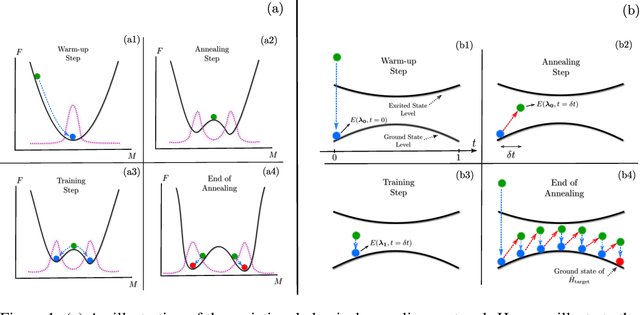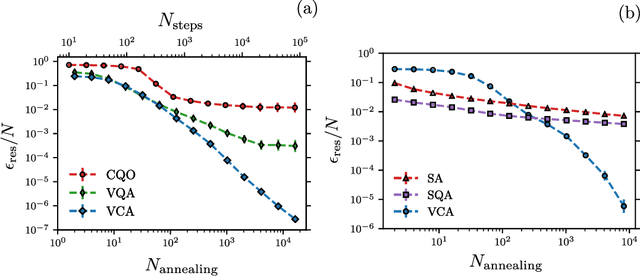Roeland Wiersema
Neural Quantum States in Mixed Precision
Jan 28, 2026Abstract:Scientific computing has long relied on double precision (64-bit floating point) arithmetic to guarantee accuracy in simulations of real-world phenomena. However, the growing availability of hardware accelerators such as Graphics Processing Units (GPUs) has made low-precision formats attractive due to their superior performance, reduced memory footprint, and improved energy efficiency. In this work, we investigate the role of mixed-precision arithmetic in neural-network based Variational Monte Carlo (VMC), a widely used method for solving computationally otherwise intractable quantum many-body systems. We first derive general analytical bounds on the error introduced by reduced precision on Metropolis-Hastings MCMC, and then empirically validate these bounds on the use-case of VMC. We demonstrate that significant portions of the algorithm, in particular, sampling the quantum state, can be executed in half precision without loss of accuracy. More broadly, this work provides a theoretical framework to assess the applicability of mixed-precision arithmetic in machine-learning approaches that rely on MCMC sampling. In the context of VMC, we additionally demonstrate the practical effectiveness of mixed-precision strategies, enabling more scalable and energy-efficient simulations of quantum many-body systems.
Scalable quantum dynamics compilation via quantum machine learning
Sep 24, 2024



Abstract:Quantum dynamics compilation is an important task for improving quantum simulation efficiency: It aims to synthesize multi-qubit target dynamics into a circuit consisting of as few elementary gates as possible. Compared to deterministic methods such as Trotterization, variational quantum compilation (VQC) methods employ variational optimization to reduce gate costs while maintaining high accuracy. In this work, we explore the potential of a VQC scheme by making use of out-of-distribution generalization results in quantum machine learning (QML): By learning the action of a given many-body dynamics on a small data set of product states, we can obtain a unitary circuit that generalizes to highly entangled states such as the Haar random states. The efficiency in training allows us to use tensor network methods to compress such time-evolved product states by exploiting their low entanglement features. Our approach exceeds state-of-the-art compilation results in both system size and accuracy in one dimension ($1$D). For the first time, we extend VQC to systems on two-dimensional (2D) strips with a quasi-1D treatment, demonstrating a significant resource advantage over standard Trotterization methods, highlighting the method's promise for advancing quantum simulation tasks on near-term quantum processors.
Variational Neural Annealing
Jan 25, 2021

Abstract:Many important challenges in science and technology can be cast as optimization problems. When viewed in a statistical physics framework, these can be tackled by simulated annealing, where a gradual cooling procedure helps search for groundstate solutions of a target Hamiltonian. While powerful, simulated annealing is known to have prohibitively slow sampling dynamics when the optimization landscape is rough or glassy. Here we show that by generalizing the target distribution with a parameterized model, an analogous annealing framework based on the variational principle can be used to search for groundstate solutions. Modern autoregressive models such as recurrent neural networks provide ideal parameterizations since they can be exactly sampled without slow dynamics even when the model encodes a rough landscape. We implement this procedure in the classical and quantum settings on several prototypical spin glass Hamiltonians, and find that it significantly outperforms traditional simulated annealing in the asymptotic limit, illustrating the potential power of this yet unexplored route to optimization.
 Add to Chrome
Add to Chrome Add to Firefox
Add to Firefox Add to Edge
Add to Edge